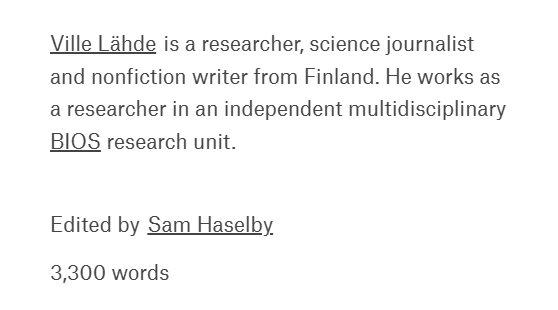Are you Confusedocene?
 As a scientific concept the Anthropocene is dead. But it’s such a helpful idea to think with, should we use it anyway?
https://aeon.co/essays/declared-dead-last-year-the-anthropocene-is-very-much-alive
As a scientific concept the Anthropocene is dead. But it’s such a helpful idea to think with, should we use it anyway?
https://aeon.co/essays/declared-dead-last-year-the-anthropocene-is-very-much-alive


In early March 2024, an expert panel of the International Commission on Stratigraphy (ICS) had a vote to settle a question that had vexed geologists for years: are we living in the Anthropocene, ‘the human age’? The result of the vote was a clear negative. In the realm of geological disciplines, the debate that endured for decades is basically over. However, the term ‘Anthropocene’ has become deeply ingrained in the public imagination and will not be simply erased. And it still has currency, but it needs to be broken loose from entrenched debates that carry unnecessary baggage. The Anthropocene is a prism through which we can examine the multifaceted history of human activities on this planet, and the spectrum of our potential futures.
The idea of humans as planet-altering agents has long roots. The American diplomat and philologist George Perkins Marsh proposed in
Man and Nature (1864) that humanity had become a geological force, on a par with the most powerful forces of nature. The term ‘the Anthropocene’ was
proposed by Paul Crutzen and Eugene Stoermer in 2000, in the multidisciplinary field of Earth System Science:

The idea was taken up in stratigraphy, the branch of geology that studies rock layers and is responsible for classifying the geological time of Earth. In 2009, an official process was begun to determine whether the Anthropocene would gain the status of a geological epoch. Although an epoch is the second smallest unit in the hierarchical classification of geologic time, past epochs have spanned millions of years, whereas the current epoch, the Holocene, is just 11,700 years old. Proposing a new epoch so soon was controversial among stratigraphers, to say the least. The newly formed Anthropocene Working Group would tackle the issue.
In official stratigraphic definition of epochs, a distinct starting point has to be decided. Every epoch begins and ends at a clear point in time. Also, a geological marker, ‘
the golden spike’, has to be found at some specific time and place. For the current Holocene epoch, the marker is based on a change in deuterium excess values, and the primary location is a borehole in Greenland.
snip



